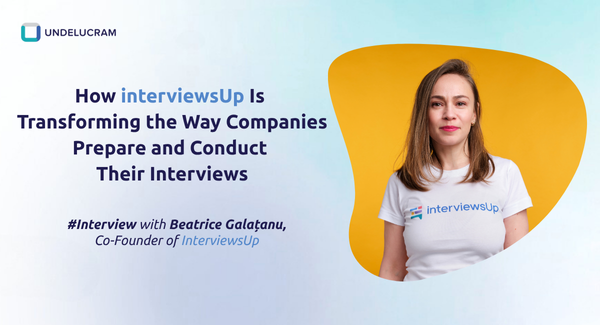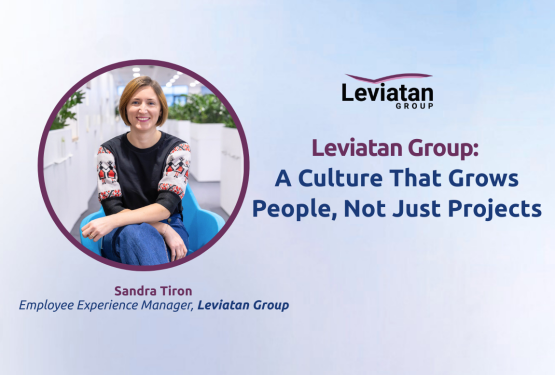Share
How interviewsUp Is Transforming the Way Companies Prepare and Conduct Their Interviews

In a context where the recruitment market is evolving and soft skills are becoming a decisive criterion, we spoke with Beatrice Galațanu, Founder of My HR Lab for 10 years and, for the past year, Co-Founder of interviewsUp. Through the businesses she leads with her team, she has had the opportunity to observe and develop numerous internal HR processes.
Today, she tells us about her experience working with hundreds of organizations and how the intelligent interviewsUp platform supports managers and HR professionals in quickly preparing for candidate interviews, collaborating effectively, and enhancing their employer brand reputation.
1. Beatrice, every month hundreds of candidates have interviews with employers, and most companies believe they “know how to conduct interviews.” From your experience, what have you actually observed?
The truth is that most interviewers are well-intentioned, but not all are prepared to conduct discussions with candidates objectively. Managers and even HR specialists ask a variety of questions, but few know how to ask the right ones, questions that actually reveal real behaviors rather than just polished or cliché answers.
From my experience, I’ve seen that most department managers use fairly general questions that, in practice, don’t differentiate candidates. Or they rely solely on technical questions because they simply don’t know which soft skills are relevant for the role. As a result, most interviews and hiring decisions are based purely on intuition.
2. Since you mentioned soft skills, what happens in companies when behavioral abilities are ignored during recruitment?
The most common issue is confusion between technical skills and soft skills. As I just mentioned, many managers believe they are conducting good interviews simply because they can evaluate the technical side. The reality is that most team problems arise not only from a lack of technical skills but also from behaviors: communication, collaboration, autonomy, adaptability, conflict management, and so on. In theory, these soft skills are left to HR to validate.
In practice, however, whether the interviewers are hiring managers or HR professionals, they often focus on validating the experience listed on the CV. What doesn’t appear in a candidate’s written document are, for example, micro-conflicts, lack of collaboration, passive-aggressive communication, or disorganization. Without questions that probe these behaviors, there is a risk of hiring the wrong person. And this has multiple impacts. A bad hire often costs around 30% of the annual salary for that role. Beyond the financial cost, the internal team suffers, the employer brand reputation is affected, and the interviewer’s personal brand may take a hit.
3. What is the biggest mistake employers make during interviews? And how could it be fixed, or how does interviewsUp address it?
I believe the most common mistake is that interviewers tend to ask closed-ended questions that don’t probe the candidate’s level of seniority or actual behaviors. They get seduced by polished answers rather than real examples. For instance, instead of asking, “How did you solve this problem?” we could say, “Please describe the key steps you took or all the actions necessary to successfully solve this problem.”
The first question is closed-ended and allows the candidate to answer vaguely: “I solved the problem easily and quickly.” The second scenario invites the candidate to give a more detailed response, explaining the actions, thought patterns, and solutions they identified.
Another common mistake is that HR and hiring managers don’t communicate or prepare together for interviews. As a result, a candidate might receive the same questions at multiple stages of the process. Plus, everything often remains undocumented.
interviewsUp addresses exactly this: it saves time and helps managers and HR professionals prepare quickly for interviews. They can select the soft skills needed for each role, rely on AI suggestions, and receive a list of interview questions crafted by experts, tailored to different seniority levels. Additionally, the platform allows for full documentation of candidate interviews, ensuring the process is structured, objective, and collaborative.
4. How does the selection of soft skills work on the platform?
You choose the role, select the seniority level, add a role description, and receive a recommended list of skills. If you’re unsure what to evaluate, our integrated AI suggests relevant behaviors. You can always adjust them or explore our library of over 70 competencies, each with its own definition and evaluation criteria.
This way, you can build your own interview guide in minutes, with expert-created questions tailored to the seniority level of the role. You can also take notes during interviews and collaborate with colleagues.
Interviewers using the platform have told us that, for the first time, they feel they understand exactly what they need to evaluate and have a tool that helps them be professional, especially as they can calibrate the role with managers and select competencies together.
5. You mentioned that an interview that fails to deliver a good candidate experience strongly affects employer brand perception. What should employers pay attention to during interviews?
An interview is the first moment of truth between a candidate and the organization. Most candidates overlook a poorly written job ad or a career page that doesn’t reflect the employer brand. However, the live interview is the first deep impression, the one that sticks. And employers don’t always realize how much the quality of the conversation matters.
Candidates remember not only how they were treated, whether the interviewer was attentive or rushed, but also whether the questions made sense or seemed cookie-cutter. From our observations at interviewsUp, three factors make the difference:
- Clarity: Candidates immediately sense if the organization knows what it’s looking for or if the interview is improvised. An interviewer who is prepared and asks coherent questions conveys professionalism and seriousness.
- Respect: This is not just about tone but also how the conversation is structured. Are you asking questions appropriate to the candidate’s seniority level, or losing them in irrelevant discussions?
- Consistency: When a candidate is asked the same thing by three different people at three stages, they start questioning the company’s professionalism. It seems like the team doesn’t communicate internally and the process feels more like a patience test than a real dialogue.
InterviewsUp aims to create a consistent, professional process where all interviewers are aligned, ask the right questions, and speak the same language. Candidates immediately notice this. They say, “It was an interview where I felt seen,” or “I understood exactly what the company is looking for and whether I fit.” This is employer branding at its most authentic, because it’s built through people’s behavior, not posts or campaigns.
6. In conclusion, what would you like to change in how companies approach interviews and their employer brand in the coming years?
Building on the mission you have at Undelucram, transparency and authenticity of employer branding,I hope that every company, regardless of size, can conduct professional interviews, even without a senior HR team.
I’d like to see more memorable interview experiences, well-documented and ethically analyzed candidate dialogues that help us understand what good decisions look like and reduce errors. The real impact is not only in recruitment but also on organizational culture.
A company that asks good questions is a company that communicates efficiently, empathetically, listens, and makes healthy decisions. Interviews are the first place where this is visible.
Request a personalized interview guide for your role at interviewsUp.ro and see in minutes how simple it can be to conduct top-notch interviews!
Share
What I read is worth it:
Article written by:
Comments
0 comments

Access your account and add your comment
Leadership skills
Subscribe to the Newsletter
Read articles of interest from Undelucram.ro contributors


